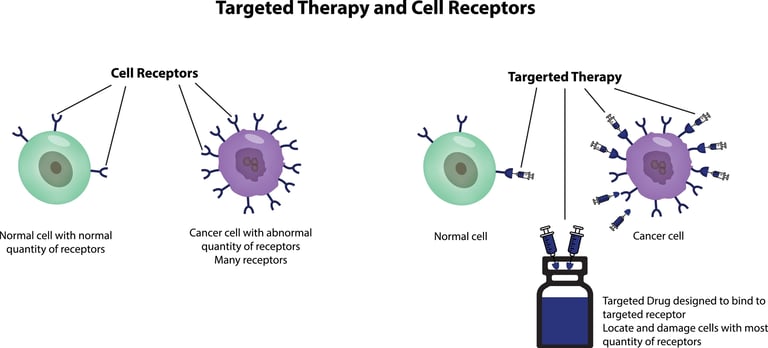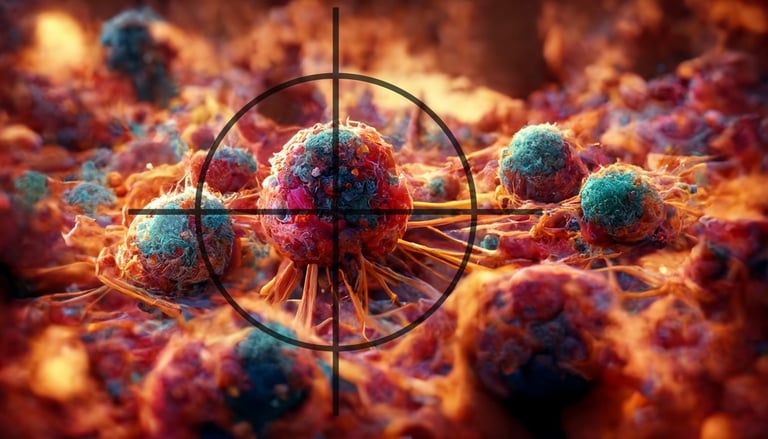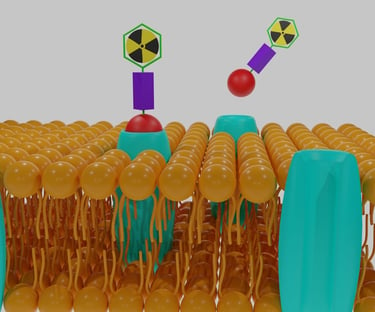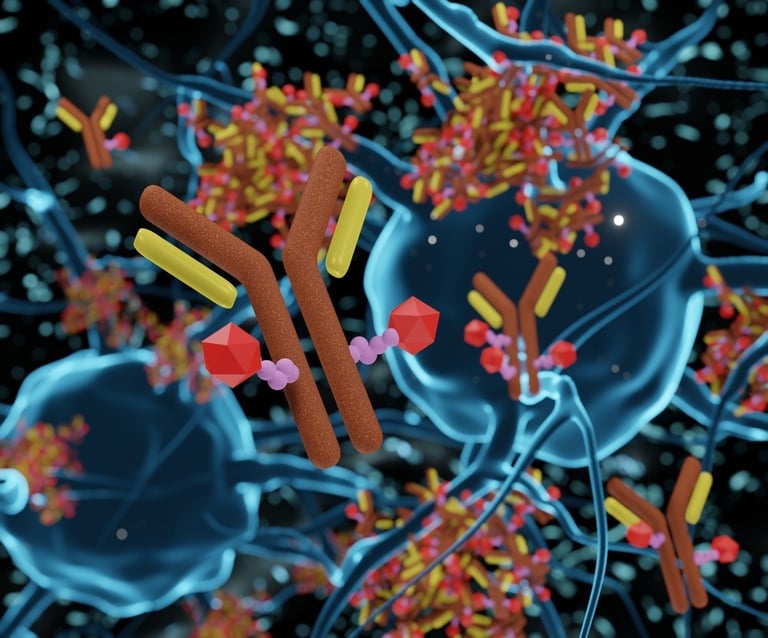Targeted Therapies (Smart Medicine)
21.03.2025
TARGETED DRUGS IN CANCER TREATMENT (SMART DRUGS)


Targeted therapies are drugs that have come to the fore in cancer treatment in recent years and are developed to target the unique biological properties of cancer cells. These treatments attack specific molecular targets found in cancer cells that play a role in the growth and spread of cancer. Genetic mutations kill cancer cells or stop their growth by acting on targets such as proteins on the cell surface or intracellular signaling pathways. One of the biggest advantages of targeted therapies is that they target cancer cells more selectively than normal cells and therefore cause fewer side effects than traditional chemotherapies. These treatments can be personalized based on patient-specific cancer profiles determined using genetic testing and molecular diagnostics. Targeted therapies, which are especially effective in some types of cancer such as breast cancer, lung cancer and melanoma, are among the innovative approaches in cancer treatment and play an important role in increasing treatment success rates. These treatments are constantly being developed and expanded thanks to ongoing research in cancer biology and treatment.
Image 1: Targeted drugs used in cancer treatment are known as smart drugs.


WHAT ARE THE TARGET MOLECULES?
The structures used as targets in cancer treatment are based on the specific biological properties of cancer cells, and these structures are critical in the development of targeted therapies. These target structures are:
Cell Surface Receptors: Some cancer cells may have high numbers of certain receptors on the cell surface. These receptors receive signals that stimulate the cell to grow and divide. For example, HER2-positive breast cancer is characterized by overexpression of the HER2 receptor, and there are targeted drugs being developed for this type of cancer.
Genetic Mutations:Certain genetic mutations in cancer cells play a critical role in the development of targeted therapy. For example, some lung cancers have EGFR or ALK gene mutations, and treatments targeting these mutations have been developed.
Signal Transmission Paths: Cancer cells depend on signal transduction pathways that are essential for cell growth and survival. These pathways can promote the uncontrolled growth of cancer cells. Signaling pathways such as BCR-ABL, RAF/MEK/ERK and PI3K/AKT/mTOR are used as targets in various types of cancer.
Tumor Microenvironment:The tumor microenvironment, which supports the growth of cancer cells and suppresses the immune system, represents a new area in the development of targeted therapies. For example, immune checkpoints in the tumor microenvironment are used as targets in immunotherapy.
Angiogenesis: The formation of blood vessels (angiogenesis) is necessary for tumors to grow and metastasize. Drugs targeting the angiogenesis process aim to prevent the nutrition and growth of the tumor.
Apoptosis (Programmed Cell Death) Pathways: Some cancer cells develop mechanisms that prevent apoptosis. Therapies that target apoptosis pathways work by promoting the death of cancer cells.
Hormone Receptors: Hormone receptors constitute an important target, especially in breast and prostate cancers. Drugs that target estrogen and androgen receptors are used to treat this type of cancer.
These target structures enable the development of individualized approaches in cancer treatment and contribute to expanding treatment options. Because these treatments generally have more specific mechanisms of action, they are associated with fewer side effects compared to traditional chemotherapy.
Image 2: Smart drugs act by targeting molecules involved in cell division and proliferation.


TARGETED DRUGS
Targeted drug groups used in cancer treatment are:
Monoclonal Antibodies:It binds to specific cancer cells or proteins that support their growth. Some common monoclonal antibodies used in cancer treatment include:
Trastuzumab: Used to treat HER2-positive breast cancer and stomach cancer.
Rituximab: It is used in the treatment of non-Hodgkin lymphoma and chronic lymphocytic leukemia.
Cetuximab: It is used in the treatment of head and neck cancers and metastatic colorectal cancer.
Bevacizumab: Used in various types of cancer such as colorectal cancer, lung cancer and glioblastoma.
Tyrosine Kinase Inhibitors: It blocks tyrosine kinase enzymes that play a role in cell growth. Tyrosine kinase inhibitors are important drugs used in cancer treatment and generally block the growth signals of cancer cells. Some examples of these drugs are:
Imatinib: It is used in the treatment of chronic myeloid leukemia (CML) and gastrointestinal stromal tumors (GIST).
Erlotinib: It is effective in the treatment of some lung cancers and pancreatic cancer.
Gefitinib: Used in non-small cell lung cancer.
Sorafenib: Used in the treatment of kidney and liver cancers.
Sunitinib: It may be effective in the treatment of kidney cancer and GIST.
Angiogenesis Inhibitors: It prevents tumors from forming blood vessels. Angiogenesis inhibitors are drugs used in cancer treatment that prevent tumors from forming blood vessels. Some examples are:
Bevacizumab:It is used in colorectal, lung, brain and other types of cancer.
Sunitinib: It is effective in the treatment of renal cell cancer and gastrointestinal stromal tumor.
Sorafenib: It is used in liver and kidney cancers.
Pazopanib: Used in the treatment of advanced renal cell cancer and soft tissue sarcoma.
Axitinib: It is used in the treatment of advanced renal cell cancer.
mTOR Inhibitors: It targets mTOR pathways that play a role in cell growth and division. mTOR inhibitors are drugs used in cancer treatment that target mTOR pathways that regulate cell growth and survival processes. Some drugs in this group are:
Everolimus: Used for various types of cancer, especially neuroendocrine tumors of the kidney, breast, and pancreas.
Temsirolimus: Used in the treatment of advanced kidney cancer.
PARP Inhibitors: It triggers the death of cancer cells by inhibiting enzymes that repair DNA damage. PARP inhibitors are drugs that target DNA repair in cancer treatment and are used especially in cancers with BRCA mutation. These drugs induce cell death by impairing the ability of cancer cells to repair DNA damage. Examples:
Olaparib: It is used in the treatment of breast, ovarian, pancreatic and prostate cancers with BRCA mutation.
Rucaparib: It is used in the treatment of advanced ovarian cancer with BRCA mutation.
Niraparib: It is used in the treatment of advanced ovarian cancer.
Talazoparib: It is used in the treatment of locally advanced or metastatic breast cancer with BRCA mutation.
CDK inhibitors: CDK (cyclin-dependent kinase) inhibitors used in cancer treatment stop or slow the growth of cancer cells by regulating the cell cycle. Examples of these drugs are;
Palbociclib: It is especially used in the treatment of hormone receptor positive, HER2 negative advanced breast cancer.
Ribociclib: It is used in the treatment of advanced or metastatic hormone receptor positive, HER2 negative breast cancer.
Abemaciclib: It is used in the treatment of advanced or metastatic hormone receptor positive, HER2 negative breast cancer, in cases resistant to endocrine therapy.
Proteasome Inhibitors: It prevents protein degradation in cells, leading to the death of cancer cells. Proteasome inhibitors used in cancer treatment prevent cancer cells from surviving by breaking down proteins. Drugs included in this group include:
Bortezomib: It is used in the treatment of multiple myeloma and Mantle cell lymphoma.
Carfilzomib: It is used in the treatment of advanced multiple myeloma.
Ixazomib: It is used in combination with other drugs in the treatment of multiple myeloma.
Hormone Treatments: In hormone-sensitive cancers, it prevents or reduces the effect of hormones on cancer cells. Hormonal treatments used in cancer treatment include:
Tamoxifen: It is used especially in hormone receptor positive breast cancers.
Aromatase Inhibitors (Anastrozole, Letrozole, Exemestane): It is used in hormone receptor positive breast cancers in postmenopausal women.
Gonadotropin Releasing Hormone (GnRH) Analogues (Leuprolide, Goserelin): It is used in prostate and breast cancers.
Antiandrogens (Bicalutamide, Flutamide, Enzalutamide): It is used in the treatment of prostate cancer.
These groups provide specific interventions into the biology of cancer, providing more effective and personalized treatment options.
Image 3: Antibody drug compounds can be created by adding chemotherapy to targeted drugs. These drugs are increasingly used in cancer treatment.


ANTIBODY DRUG CONJUGATES
Antibody drug conjugates used in cancer treatment are drugs that enable antibodies to bind to antigens specific to cancer cells and transport drugs or toxic substances to these cells. This treatment method combines the target specificity of the antibody and the power of the drug to kill cancer cells. Examples include:
Ado-Trastuzumab Emtansine: It is used in the treatment of HER2-positive breast cancer.
Brentuximab Vedotin: It is used in the treatment of Hodgkin lymphoma and anaplastic large cell lymphoma.
Gemtuzumab Ozogamicin: It is used in the treatment of acute myeloid leukemia (AML).
These drugs aim to minimize damage to normal cells while acting directly on targeted cancer cells. Each drug has its own targets, uses and side effects.
SIDE EFFECTS ?
Side effects of targeted “smart drugs” vary depending on the drug and the type of cancer being treated. Common side effects may include:
Skin Problems: Skin problems such as rash, itching and dryness are common.
Tiredness: The patient may often experience a general feeling of fatigue.
Gastrointestinal Problems: Digestive system side effects such as nausea, vomiting and diarrhea may occur.
Liver Function Changes: Some medications can cause an increase in liver enzymes.
Changes in Blood Values: A decrease in the number of blood cells may occur, such as anemia, leukopenia and thrombocytopenia.
Hypertension: Increased blood pressure may be observed with some medications.
Cardiac Problems: Changes in heart function and heart failure may increase the risk.
These side effects vary depending on the type of medicine and the person's individual health condition. It is important to communicate with your doctor to manage and control side effects.
Cancer treatment is one of the most complex and constantly evolving areas of medicine. Today, targeted therapies called "smart drugs" have created a great revolution in this field. These drugs aim to effectively destroy cancer cells while causing minimal damage to healthy cells by recognizing cancer cells through specific targets. This approach has fewer side effects than traditional chemotherapy and can significantly improve patients' quality of life. In the future, the use of smart drugs may expand further and become part of personalized treatment plans. With a better understanding of the genetic and molecular architecture of cancer, these drugs have the potential to provide more effective and customized treatments for specific types of cancer. Thus, smart drugs stand out as a promising and constantly developing field in cancer treatment.
